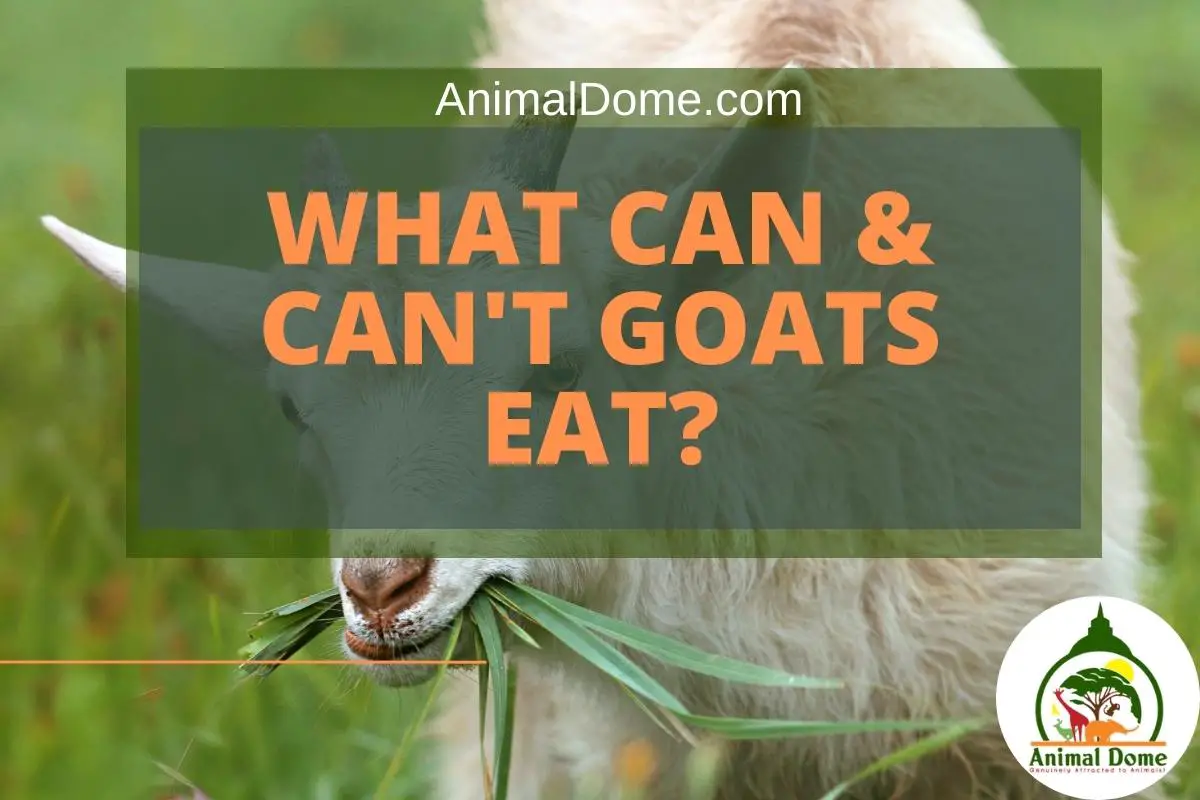I’ve been around goat farms for most of my adult life, usually by volunteering at one around the corner from me. My good friends at Humble Heart Farms in Elkmont, AL sat down with me to answer many questions that we had on what constitutes a healthy goats’ diet as well as many FAQs on what goats can and can’t eat. BTW – they make the best goat cheese on both sides of the Mississippi 🙂
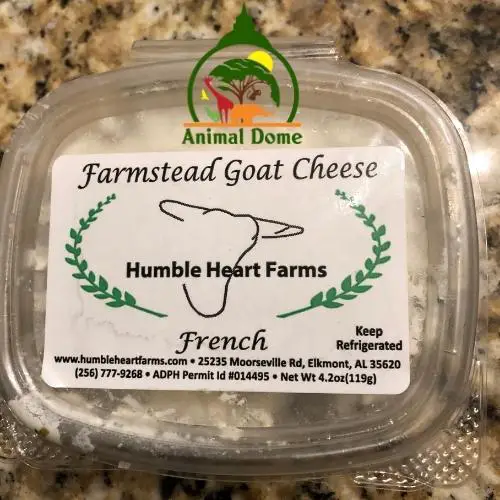
How Much Do Goats Eat?
Goats do not have a large appetite compared to other farm animals such as cows, so they can live on less food than larger animals.
On average, a healthy goat should eat 2 percent of its body weight per day or about 1 ounce per pound of body weight every day.
The amount of food that your goat needs depend on several factors including:
Age – Young goats will need more food than adults because they are growing rapidly. Older goats consume less food because their bodies don’t need as much energy for growth and maintenance as younger animals do.
Health – Sick goats will eat less food than healthy goats because they are not producing enough energy in their bodies to support normal activity levels and growth. If you have an animal that is not feeling well, cut back on its rations until they recover fully from whatever illness they have contracted.
Pregnancy/Lactation – A pregnant or lactating goat will eat more than usual because she needs extra nutrients for herself as well as for her unborn kid or kid(s). Pregnant goats should receive about 1% of their body weight daily in hay or pelleted feed; lactating goats should receive about 2% of their body weight daily in hay or pelleted feed.
Feed Type – Goats that receive only pasture and hay could eat as little as 1 pound per day (0.45 kg). Goats on higher-quality diets may need up to 4 pounds (1.8 kg) of feed per day.
Can Goats Eat Bread?
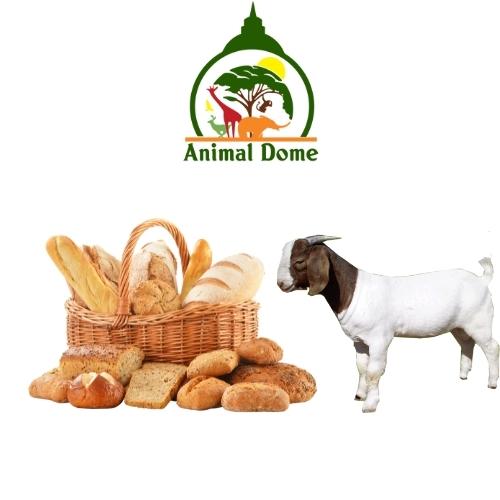
Goats can eat bread, but not all bread!
Bread is a carbohydrate, which means that it will be broken down into sugars and starches by the goat’s digestive system. These products are readily absorbed by the goat, meaning that the goat will get more calories from the bread than she would from other food sources with fewer carbohydrates. However, too much starch can cause diarrhea and bloat in goats.
The amount of flour in bread varies from brand to brand. Some bread is made with whole wheat flour, which has more nutrients than regular flour and is better for your goats’ health. Other brands use refined white flour, which has had all its fiber removed. If you’re unsure of what kind of flour your bread contains, ask at the store or look at the ingredients list on the package before buying it for your goats.
If your bread contains whole wheat flour or another type of nutritious grain such as oats or cornmeal, then it may be safe for your goats to eat small amounts of it.
Can Goats Eat Cabbage?
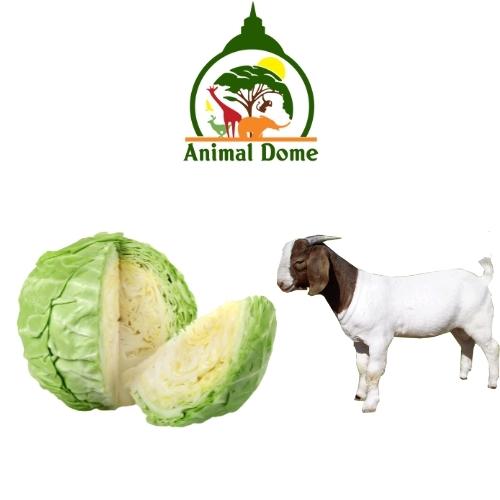
Cabbage is a healthy and nutritious meal for goats, therefore yes, they can eat it. Goats need a wide variety of nutrients found in cabbage, including vitamin C, carbohydrates, vitamin K, proteins, folate, and a host of others. It’s also a nutrient-dense vegetable that tastes great.
Additionally, it would be beneficial if you did not overfeed your goat’s cabbages. You make less than 10% of your daily calorie intake and serve it as a snack. Remember to only feed your goats fresh, clean cabbages to prevent bloating. Make sure that these cabbages are chopped into little bits as well.
Can Goats Eat Celery?
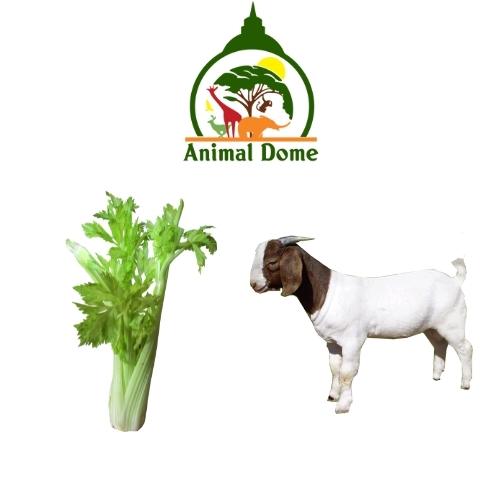
Yes! The performance of goats can be improved by feeding them celery. Celery is an excellent source of nutrients and minerals that are essential for the health and growth of animals. Vitamins K, B2, C, A, and B6 are found in them. Other minerals include potassium, manganese, calcium, and salt.
Additionally, celery is a notable source of phytonutrient antioxidants such as phenolic acids, flavones, flavonols, dihydrostilbenoids and furanocoumarins, which have been shown to have anti-inflammatory and antioxidative properties. Celery can only be fed to goats as a supplement, according to agricultural specialists. Staple food rich in nutrients that are lacking should be provided with this supplement.
Celery, on the other hand, should only account for 10% of your whole diet. Excessive feeding of livestock puts them at risk of developing health problems that hurt production and profitability.
Can Goats Eat Oranges?
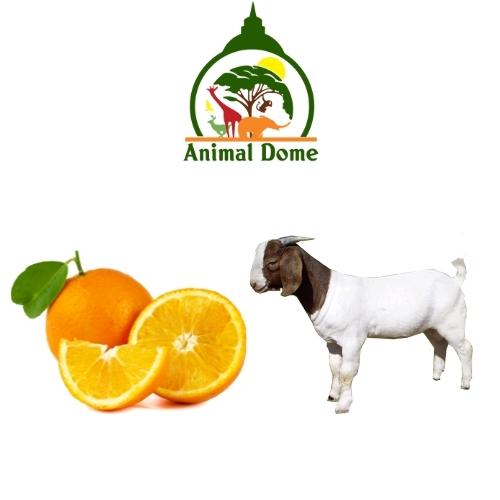
The answer is yes, goats are capable of consuming oranges and their peels. Providing your goats with an orange is a safe, healthy, and nutrient-rich reward.
Unless you reside in a warm climate and have citrus trees on your land, it is unlikely that your goats will encounter oranges while grazing. While not a necessity, they are a lovely treat for your goats now and again. Oranges are a favorite fruit of goats because of how sweet and juicy they are.
You’ll want to set a reasonable upper limit on how much you consume, as you would with any other sweet. Goats who have their diets disrupted are likely to suffer from gastrointestinal distress.
Can Goats Eat Asparagus?
Yes, goats can eat asparagus, and it can be given to their diet as a supplement. As long as goats are fed asparagus in combination with other fodders, it is safe for them.
Asparagus is a favorite food of goats, and even little quantities are not harmful to them. When feeding asparagus to goats solely, be aware that the presence of toxicity in the asparagus might be poisonous, even in small doses.
After giving asparagus to goats, you’ll notice a difference in the scent and color of their urine, but don’t be alarmed.
Can Goats Eat Apples?
What’s healthier than an apple? Goats can consume apples. The health benefits of apples are not a secret, and just as this nutrient-dense fruit has significant benefits for humans, the same is true for goats.
Apple contributes to the nutritional content of a well-balanced diet for lactating goats by including all of the necessary components. Apple is okay for goats to consume a couple of times each week.
Can Goats Eat Watermelon?
Definitely! You should know that goats can eat watermelon and that they will like it immensely. All components of the watermelon, including the rinds, seeds, and even the vines, are edible to these creatures.
Watermelon, in addition to being delicious, is also a rather nutritious treat. Almost 90% of it is made up of water. This makes it ideal for feeding during the warmest summer days when you want to ensure your goats are getting enough water.
Can Goats Eat Strawberries?
Yes! One of the most commonly consumed fruits by goats is strawberries, which are safe for them to eat. Strawberries are a great source of vitamins C and K, as well as other phytonutrients, making them an ideal healthful snack. Goats’ natural diet doesn’t include strawberries, so don’t panic if you don’t like them.
Some goats can’t stand the acidity or sourness of the food. As a result, goats should only be fed strawberries in moderation and should be introduced to them gradually. For your goat, it’s also a good idea to cut up strawberries. To ensure that your goat does not consume any pesticides or dirt, wash the strawberries before feeding them to it.
Can Goats Eat Bananas?
The excess of anything is bad, so as long as goats eat bananas in moderation, there’s nothing to worry about. Bananas have numerous health advantages for goats.
Bananas are a great source of vitamins B, C, fiber, and potassium for your goats. Make sure to give your goats only a small amount of banana each time they have a snack so that they don’t overeat.
Can Goats Eat Tomatoes?
Definitely! Tomatoes have a high water content — approximately 95% of a tomato is water. This means that goats can eat tomatoes with no known health consequences. Tomatoes can help your goat’s bowels clear out if it has been suffering from digestive issues. This has been shown in numerous studies.
However, allow your goat to consume only the tomato fruit. The leaves of the tomato plant are toxic to goats because they contain high concentrations of alkaloids. Alkaloids extracted from plants are used to create drugs like morphine and even poisons like atropine. Numerous tomato plants ingested by goats can induce unconsciousness and seizures, ultimately leading to their demise.
Can Goats Eat Peanut Butter?
Peanut butter is good for goats to eat. However, like peanuts, they should only be given to children as a special treat and not as a meal replacement. While peanut butter is safe for goats, it does not cover all of their nutritional needs. Goats, on the other hand, should not eat it regularly.
Before feeding your goats peanut butter, make sure to check the ingredients. Other elements in peanut butter, however, may be detrimental to goats. One of the reasons why goats shouldn’t eat chocolate is because peanut butter may include chocolate.
Once you are sure there is no potentially harmful ingredient, you may let the goat consume it. Additionally, if a goat eats too much peanut butter, it may become ill.
Can Goats Eat Tin Cans?
The answer to this question is no. Goats cannot eat tin cans. While goats can digest pretty much any plant matter, tin cans have a chemical coating that makes them toxic for goats.
They are the ones who have survived because they have mastered the art of locating the healthiest foods. Unlike humans, goats will only examine inside a container to see if there is anything they can get their teeth into.
Even if a goat does ingest a tin can, it’s unlikely that the goat will be poisoned because the number of toxic chemicals in the can are minimal and diluted by the other things that goats eat. However, even small amounts of these toxic chemicals could lead to stomach pain or other digestive issues in your goat.
Do Goats Eat Grass?
Indeed they do! Goats are ruminants. They have four stomach chambers and a cud-chewing cycle. The digestive system of a goat is specialized in digesting grass and other ground-growing vegetation. To maintain a balanced diet, goats will graze on grass, especially when stalky forages are scarce, although grass does not make up a significant portion of their diet. And while goats occasionally consume grasses, not all grasses are suitable for goat consumption. Certain types of grass are unsuitable for goats, and grass should never comprise the majority of a goat’s diet.
Do Goats Chew Cud?
It is fortunate for goats because they can also digest their food this way. Goats chew cud because they too rely on grass and hay as their primary source of nutrition. Having a good appetite would be a terrific sign that the animal is healthy and well-fed.
A goat that does not chew cud may be sick or amid a medical condition. They may appear to be eating all of the hay and grass you’ve provided, but neglecting to chew cud renders the diet useless because it lacks the vitamins and minerals necessary for the animal’s healthy growth.
Do Goats Eat Carrots?
The fibre and nutrition in carrots make them an excellent food for goats. Carrots may be consumed uncooked, boiled, or steamed. Like watermelons, carrots should not be a staple food, but rather a snack or an occasional treat. Goats must be fed a balanced diet to grow up healthy and disease-free.
Overfeeding carrots to goats can result in huge weight gain, urinary calculi, digestive problems, and bloating. Other goats can also report itching on their tongues, mouths, and throats as a result of allergic responses. Flatulence or excessive stomach gas in goats is also a possibility.
Will Goats Eat Poison Ivy?
Goats love to eat poison ivy, and it has no negative effects on them. However, due to a deadly, liquid material found in poison ivy sap, the plant is known as a hazard to human health. Sap from this tree causes allergic reactions in humans, such as rashes, itching, and hives, when they come into contact with it.
Goats, on the other hand, are exempt from this difficulty. Goats may be able to eat this invasive plant because they have enzymes in their digestive system that prevent them from experiencing any negative consequences. It is also possible that goats have acquired resistance to the deadly plant due to a lack of alternative food sources.
Some believe that goats’ rumen bacteria degrades poison ivy so that they can safely consume it. Regardless of the cause, it’s wonderful to know that goats can eat poison ivy without harming themselves, and they can remove it so you don’t have to!
Will Goats Eat Kudzu?
Almost every part of the invasive plant that goats may consume is acceptable for consumption by them, even the kudzu.
Goats can benefit from eating kudzu if it’s part of a balanced diet. The plant is a good source of crude protein for goats. Kudzu has a protein and fiber level of 15 to 18 percent.
Kudzu is a safe food for most agricultural animals and livestock, including goats, which are known for their ability to eat a wide variety of plants. Goats can eat the leaves, flowers, vines, vine tips, and roots in moderation without causing any harm. The kudzu may be surrounded by other dangerous plants, so beware!
Will Goats Eat Bamboo?
Goats love bamboo. Goats can eat them with no worries because they’re high in nutrients and completely harmless to them. Because of this, some animal experts propose that you use them as an alternative to the grass hay that your goats are used to eating.
Another advantage of bamboo is that it helps protect your goats from parasites in their gastrointestinal tract. We’re all aware that gastrointestinal parasites are terrible for goats’ health.
Goats can also consume bamboo leaves, just like they can eat other types of leaves in the wild. Goats can eat bamboo leaves because they are safe and nutritious for them. If grass hay isn’t readily accessible where you live, it can be an excellent feeding source for your goats.
Will Goats Eat Blackberry Bushes?
The answer is yes, goats can consume blackberries. Goats will eat anything, including the thorns, because it is one of their favorite delicacies, and they will consume every part of the plant. Because goats enjoy it to such a high degree, it is even possible to utilize them as tools for clearing overgrown blackberry fields.
Your goat’s health may benefit from the consumption of blackberries due to the high levels of various vitamins, minerals, and other helpful nutrients that are found in blackberries. Blackberries are an excellent source of fiber as well as antioxidants; they are also low in fat and carbohydrates and include manganese, vitamin C, and vitamin K.
Your goat will love blackberries, but you need to watch how much it eats of them and also make sure it eats a balanced, nutritious diet regularly.
Can Goats Eat Pumpkins?
It is safe for goats to eat all of the pumpkin’s parts, including its flesh, seeds, and skin. You can feed your goats pumpkins, which are rich in nutrients, and the seeds can be used as a biological dewormer.
Vitamins A and B, as well as protein and fiber, are found in pumpkins. They benefit from increased levels of vitamin A because it strengthens their immune systems. If your goats’ eyes are dry, it’s a sure sign they’re deficient in vitamin A, which pumpkins can remedy.
Goats can also eat pumpkin vines when food is limited and pumpkin vines are flourishing in your yard. Whenever possible, ensure that pumpkins are sliced into small pieces before feeding them so that they do not choke.
What To Feed Goats To Gain Weight?
Goats are energetic creatures. They exhaust roughly as many calories as they consume. Therefore, a correct feeding procedure for children and adults is required to maintain a healthy weight.
Here are a few foods to think about while trying to get your goat to put on weight:
Water
You have a duty as a farmer to make sure your goats have access to clean, fresh water at all times. Pregnant and nursing does, for example, may require water that is not readily available, so it is always a good idea to keep a supply of water on hand for these animals.
Grass
Providing enough browsing space for your goats is the most practical and cost-effective method for providing them with natural and consistent feeding.
It is strongly recommended to provide goats with ample pasture and browsing space where they can consume a variety of feeds and leaves. However, you can feed them grains if there is no grazing land in your neighborhood.
Proteins
Proteins help goats grow muscle and assist glucose digestion, much as they do in humans. Goats with a protein shortage may digest carbohydrates too quickly and incompletely, resulting in low energy and inadequate mineral absorption.
A minimum of 7% crude protein is required for meat goats. Anything less than that may result in a reduction in forage consumption, which could lead to weight loss.
Grain
Because of their high carbohydrate content, grains like corn and oats are the quickest and easiest approach to help your goat gain weight.
Goats, on the other hand, should not be fed more than 1.5 pounds of grain every day, according to experts. Start with a quarter of a pound a day for newbies and work your way up from there.
Vitamins
Vitamins are vital for a goat, even if they are only required in little amounts. Vitamin A injections or a mineral mix containing vitamin A should be administered to goats fed long-term stored pasture or weathered forage.
For the body to naturally synthesize vitamin D, exposure to sunlight regularly is preferable to high-quality sun-cured hays.
Supplement of Vitamins and Minerals
The amount of carbs, fats, and proteins you feed your goat determines how much vitamin and mineral supplementation it will receive. Most feed stores carry these supplements, and they can be purchased over the counter.
Alternatively, a mineral block including these supplements could be offered as a free choice to patients. Mineral blocks, on the other hand, should be avoided due to their high salt content. Constipation and other health problems might result from eating too much grain.
What To Feed Goats To Increase Milk Production?
Ensure that your nanny goat is getting the best possible hay from legumes. Protein content in good hay ranges from 15% to 20%. In terms of protein content, alfalfa is the best legume hay. Alyce clover and perennial peanuts are also excellent legumes.
Every day, give your goat 2 to 3 pounds of grain to eat. For every quart of milk the doe produces, some farmers allow the doe to eat 1/2 pound of grain. Corn, oats, and soybean meals may be included in the mix, along with vitamins and minerals. Protein content should range between 14 and 20%.
Goats need fiber in their diets. Chewing and ruminating are aided by high-quality fiber. Goats’ milk fat content drops when they don’t chew enough. Sunflower and cotton seeds are excellent sources of fiber for dairy goats.
Why Do Goats Eat Everything?
Simple answer: they’re browsing animals, not grazing animals, as the name implies. They’ll eat nearly anything that even vaguely resembles plant stuff because they’re curious and enjoy chewing on fiber, which may be found in little amounts in clothing as well.
Because their digestive systems aren’t capable of breaking down anything, they are limited in their abilities. Of course, saying that goats will eat anything is a myth.

